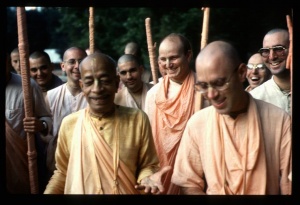CC Madhya 9.146 (1975)

A.C. Bhaktivedanta Swami Prabhupada
TEXT 146
- siddhāntatas tv abhede 'pi
- śrīśa-kṛṣṇa-svarūpayoḥ
- rasenotkṛṣyate kṛṣṇa-
- rūpam eṣā rasa-sthitiḥ
SYNONYMS
siddhāntataḥ—in reality; tu—but; abhede—no difference; api—although; śrī-īśa—of the husband of Lakṣmī, Nārāyaṇa; kṛṣṇa—of Lord Kṛṣṇa; svarūpayoḥ—between the forms; rasena—by transcendental mellows; utkṛṣyate—is superior; kṛṣṇa-rūpam—the form of Lord Kṛṣṇa; eṣā—this; rasa-sthitiḥ—the reservoir of pleasure.
TRANSLATION
" 'According to transcendental realization, there is no difference between the forms of Kṛṣṇa and Nārāyaṇa. Yet in Kṛṣṇa there is a special transcendental attraction due to the conjugal mellow, and consequently He surpasses Nārāyaṇa. This is the conclusion of transcendental mellows.'
PURPORT
This is a verse from the Bhakti-rasāmṛta-sindhu (1.2.59). Here Śrīla Kṛṣṇadāsa Kavirāja says that Lord Caitanya spoke the verse to Veṅkata Bhaṭṭa, and earlier he said that Veṅkata Bhaṭṭa spoke it to the Lord. But since their conversation took place long, long before the Bhakti-rasāmṛta-sindhu was composed, the question my be raised as to how either of them quoted the verse. Śrīla Bhaktivinoda Ṭhākura explains that this verse and many others like it were current among devotees long before the Bhakti-rasāmṛta-sindhu was composed. Thus devotees would always quote them and explain their purport in ecstasy.